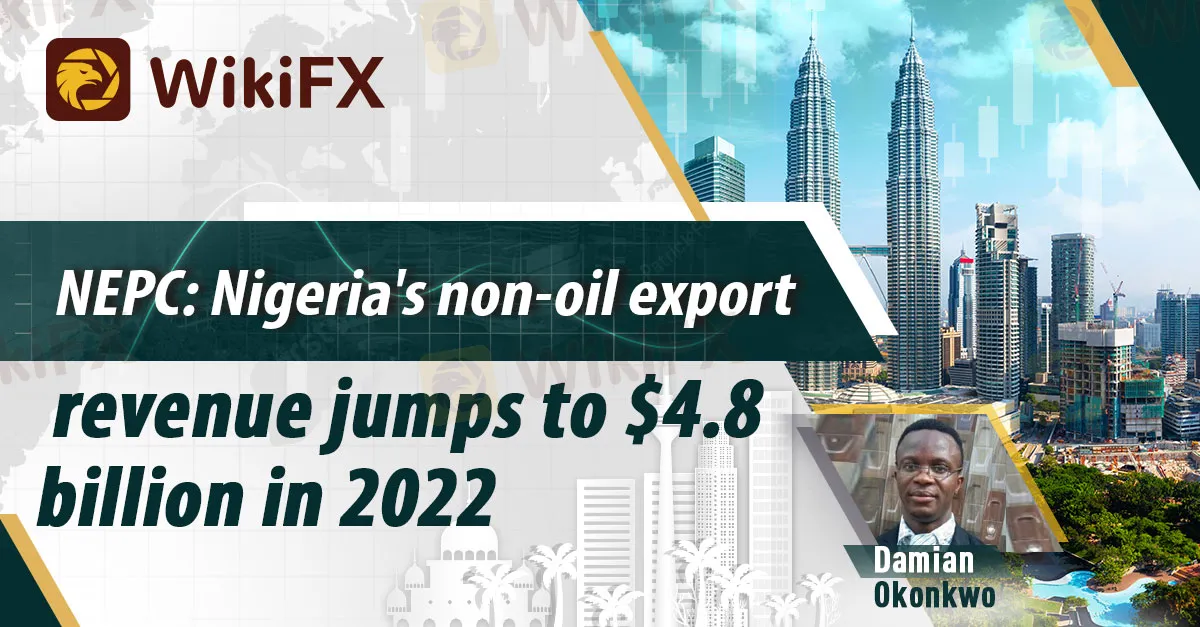简体中文
繁體中文
English
Pусский
日本語
ภาษาไทย
Tiếng Việt
Bahasa Indonesia
Español
हिन्दी
Filippiiniläinen
Français
Deutsch
Português
Türkçe
한국어
العربية
NEPC: Nigeria's non-oil export revenue jumps to $4.8 billion in 2022
Abstract:Nigeria recorded a significant increase in its total non-oil export for 2022. The total non-oil export according to the NEPC data rose to $4.8 billion in 2022.

By: Damian Okonkwo

Nigeria's non-oil exports have risen to $4.8 billion in 2022, according to the National Export Promotion Council (NEPC). This marks a significant increase from the previous year, as the country continues to diversify its economy away from relying heavily on oil exports.
The NEPC attributed the growth in non-oil exports to the government's efforts to promote local industries and encourage the production of goods for export. The council also cited the improving business environment and the availability of funding for small and medium-sized enterprises as key factors in the increase.
Some of the major non-oil export products that contributed to the increase include agricultural products such as cocoa, rubber, and sesame seeds. Other significant exports include solid minerals, textiles and garments, and processed foods.
The NEPC also revealed that the country's non-oil exports have been growing at a steady pace over the past few years, with a significant increase recorded in 2019 and 2020. The council is optimistic that the trend will continue, as the government continues to implement policies that support the growth of non-oil exports.
The rise in non-oil exports is good news for Nigeria's economy, as it reduces the country's dependence on oil and diversifies its revenue streams. It also creates job opportunities for citizens and helps to improve the standard of living for the people.
Overall, the NEPC's report is an encouraging sign for Nigeria's economy, as it demonstrates the country's ability to grow and diversify its exports. It is also a call to action for the government and private sector to continue to invest in and support non-oil export sectors for sustainable economic growth.

Disclaimer:
The views in this article only represent the author's personal views, and do not constitute investment advice on this platform. This platform does not guarantee the accuracy, completeness and timeliness of the information in the article, and will not be liable for any loss caused by the use of or reliance on the information in the article.
Read more

Geopolitical Events: What They Are & Their Impact?
You've heard many times that geopolitical events have a significant impact on the Forex market. But do you know what geopolitical events are and how they affect the FX market? Let us learn about it today.

Why Do You Feel Scared During Trade Execution?
Trade execution is a pivotal moment for traders. It is when analysis turns into action, and potential profits or losses become reality. However, for many traders, this moment is accompanied by fear. Why does this happen, and how can you address it?

WikiEXPO Global Expert Interview: Simone Martin—— Exploring Financial Regulation Change
In the midst of financial innovation and regulation, WikiGlobal, the organizer of WikiEXPO, stays abreast of industry trends and conducts a series of insightful and distinctive interviews on pivotal topics. We are delighted to have the privilege of inviting Simone Martin for an in-depth conversation this time.

MultiBank Group Wins Big at Traders Fair Hong Kong 2024
Discover how MultiBank Group, a global leader in financial derivatives, secured three prestigious awards at Traders Fair Hong Kong 2024, highlighting its innovative trading solutions and industry excellence.
WikiFX Broker
Latest News
Volkswagen agrees deal to avoid Germany plant closures
Geopolitical Events: What They Are & Their Impact?
Top 10 Trading Indicators Every Forex Trader Should Know
WikiEXPO Global Expert Interview: Simone Martin—— Exploring Financial Regulation Change
TradingView Launches Liquidity Analysis Tool DEX Screener
MultiBank Group Wins Big at Traders Fair Hong Kong 2024
'Young investors make investment decisions impulsively to keep up with current trends' FCA Reveals
Why Do You Feel Scared During Trade Execution?
CySEC Settles Compliance Case with Fxview Operator Charlgate Ltd
Malaysian Influencer Detained in Taiwan Over Alleged Role in Fraud Scheme
Currency Calculator


